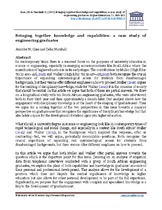Bringing together knowledge and capabilities: a case study of engineering graduates
Abstract
In contemporary times there is a renewed focus on the purposes of university
education in science or engineering, especially inemerging economycontexts like South Africa
where the massification of higher education is in its early stages. The contributions by Muller
(High Educ 70(3):409–416, 2015) and Walker (High Educ 70(3):417–425,2015) both recognise
the crucial importance of expanding epistemological access for students from disadvantaged
backgrounds, but their visions offer different emphases on howto proceed.Muller (2015)
argues for the centring of disciplinary knowledge, while forWalker (2015) it is the concerns of
society that should be central. In this article we argue that both of these are partial answers.We
draw on a longitudinal study with ten South African engineering graduates, who were interviewed
both in their third year and then approximately a decade later. Our analysis shows how
the engagement with disciplinary knowledge is at the heart of the shaping of ‘graduateness’.
Thus we argue for a coming together of the two perspectives in this issue towards a nuanced
perspective on graduateness that recognises the significance of disciplinary knowledge but that
also holds a space for the development of student agency in higher education.

